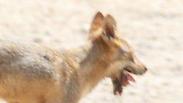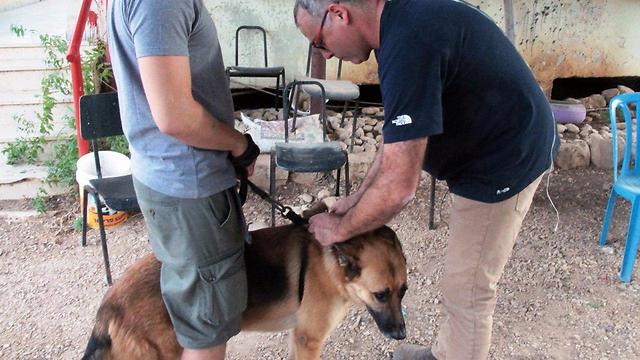
Jackal wandering near Beit Shemesh
צילום: אופיר בן חמו
Plan to combat worst rabies outbreak in Israeli history in limbo over funds
There has been a 400% spike in recorded rabies cases in Israel, but the Ministry of Agriculture is only willing to foot 5% of the bill, demanding the rest of the NIS 20 million a year plan be paid by the Environmental Protection Ministry and the Treasury.
A 400% spike in rabies cases has been recorded in Israel over the past year, giving rise to a squabble between the ministries of Agriculture, Environmental Protection and Finance over who would foot the bill of a prevention plan.
![]()
While there have been 72 cases reported in Israel of people and animals being bitten by rabies-infected dogs, jackals and other animals since the beginning of 2017, the government has yet to approve a NIS 20 million a year plan to prevent the disease from spreading further.
The Knesset's Economic Affairs Committee met last week to discuss the outbreak, which is the worst in Israel's history. Chairman MK Eitan Cabel determined the Agriculture Ministry was culpable as it has so far failed to establish an emergency team to deal with the outbreak.
"If the ministry doesn't come to its senses and better deals with the situation, there will be a commission of inquiry," Cabel warned, demanding the Agriculture Ministry to establish an emergency team that will include all relevant bodies.
A letter by Kobi Goldberg from Kibbutz Beit HaShita was read out during the committee meeting, describing his 6am meeting with a rabies-infected jackal in his back yard.
"The jackals are normally afraid of us, but not this one. He advanced quickly towards the glass door, and I immediately realized this was the rabies disease running towards me, a disease I was seeing at its worst for the first time, and it was paralyzingly frightening."
"I was sure the jackal would break the glass—because of the force with which it pounded on it—and manage to break into the house. I kept thinking how I could defend myself against it and prevent it from reaching my children and my dog. I overcame the paralysis that had plagued me, grabbed a chair and prepared for the moment the glass would break," Goldberg continued.
Goldberg's children were awoken by the noise and left their rooms to find the source of the commotion.
"Suddenly, after a short while (which felt like forever), the jackal turned back and went on his way to terrorize the kibbutz. I called the council immediately, and it is my understanding that another sick jackal was captured later that day down the street from us," Goldberg wrote.
Most of the recent rabies cases were discovered at the Gilboa Regional Council. Council head Oved Nur warned of possible harm to citizens. "Everyone is saying there is an emergency, but no one is doing what is supposed to be done in emergencies. We're collapsing, we've reached our limit. We don't have enough manpower, and we urgently need budgetary help."
Nur said he was worried street cats, which can also be infected with rabies, would scratch residents. "There is less awareness" when it comes to cats, he explained.
According to the head of the Israel Veterinary Medical Association, Dr. Avi Tsarfati, 16 cases of rabies were reported in December alone—13 in jackals, 2 in dogs and one in a calf.
"A man and a woman were also attacked this month in two separate incidents in the Gilboa area by infected jackals, and were taken to the hospital to receive medical treatment," Dr. Tsarfati said.
"It's important to note that other than the 16 cases that were discovered, there are estimates of dozens of other cases that have not been discovered, which leads to the great concern the disease would continue to spread," he added.
It took the Agriculture Ministry several months to take any action against the growing rabies outbreak in northern Israel. Ministry officials tried to shirk responsibility, blaming previous agriculture ministers of inaction, but it was current Minister Uri Ariel who tried to cut rabies vaccination in 2015.
A month ago, Ariel held a discussion on the matter, reaching almost identical conclusions to those formulated during the last outbreak in 2011.
Recently, ministry officials finished formulating a plan to combat the rabies outbreak over the course of the next three years. It includes, like in 2011, vaccination, close monitoring of the situation, clearing carcasses of farm animals, proper handling of agricultural waste and the controlled elimination of stray dogs, jackals and foxes.
While in 2011, the plan was priced at NIS 15 million a year, this year it was priced at NIS 20 million a year.
But the Agriculture Ministry is only willing to allocate NIS 1 million a year for the plan, demanding an additional NIS 10 million from the Environmental Protection Ministry, NIS 8 million from the Finance Ministry and the rest of the money from others bodies. The Environmental Protection Ministry refuses to foot half the bill, and so the plan cannot yet be presented to the government for approval.
While Minister Ariel's office claims the Finance Ministry is also refusing to allocate money for the plan, Treasury officials insist the funds have already been allocated.
Goel Beno contributed to this report.











